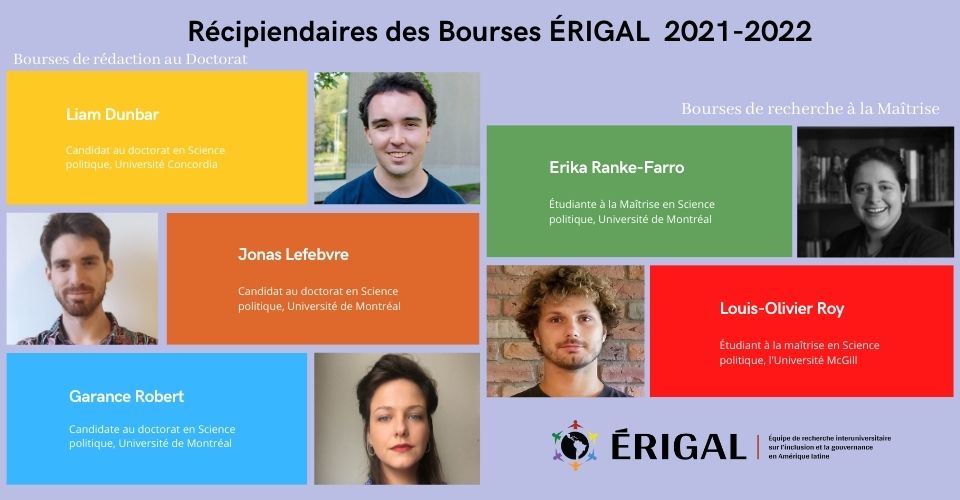Congratulations to the recipients of the ÉRIGAL 2021-2022 scholarships!

ÉRIGAL is pleased to award three PhD’s writing scholarships worth $2,500 each and two Master’s research grants of $1,500 each for the year 2021-2022
Our recipients have very original and exciting research projects:
Ph.D Students:
Liam Dunbar, a Ph.D student in Political Science at Concordia, is interested in the impact of the transition from neoliberalism to neo-extractivism in Bolivia on the anti-government resistance of environmental and indigenous organizations. He proposes to study the extent to which certain factors specific to neoliberalism and neo-extractivism have influenced the development of forms of political resistance to these systems.
Jonas Lefebvre, a Ph. D student in political science at Université de Montreal, is questionning the legacy of participatory institutions in a context of democratic narrowing in Brazil. More specifically, adopting a sociological perspective, he will focus on the trajectories of the citizens who were involved in participatory institutions recently suspended.
Finally, Garance Robert, Ph.D student in Political Science at Université de Montréal, will explore the uses of human rights norms by human rights organizations through a comparison of Guatemalan and Nicaraguan groups. More specifically, she will attempt to shed light on how, for what purposes and with what results these actors appropriate and use international human rights standards in local contexts that are a priori hostile to the promotion and respect of these norms.
Master's Students:
Erika Ranke-Farro, Master's student at the Université de Montréal, is interested in the analysis of North-South relations and the role of international organizations in development and the maintenance of inequalities. As part of her video capsule project, she proposes an analysis of racism and the construction of the Chola identity in Peru by interviewing Marco Avilés, author of several books on the subject and journalist specializing in racism and diversity.
Louis-Olivier Roy, is interested in the phenomenon of criminal gangs that control different territories in Latin America. He will try to establish a causal relationship between variations in crime in the 262 municipalities of El Salvador and the flow of remesas. As part of his video capsule project, Louis-Olivier proposes to interview a Salvadoran NGO leader about domestic violence in El Salvador, as well as the consequences of the pandemic on the increase of this type of violence.
We wish them great success in their research project!


